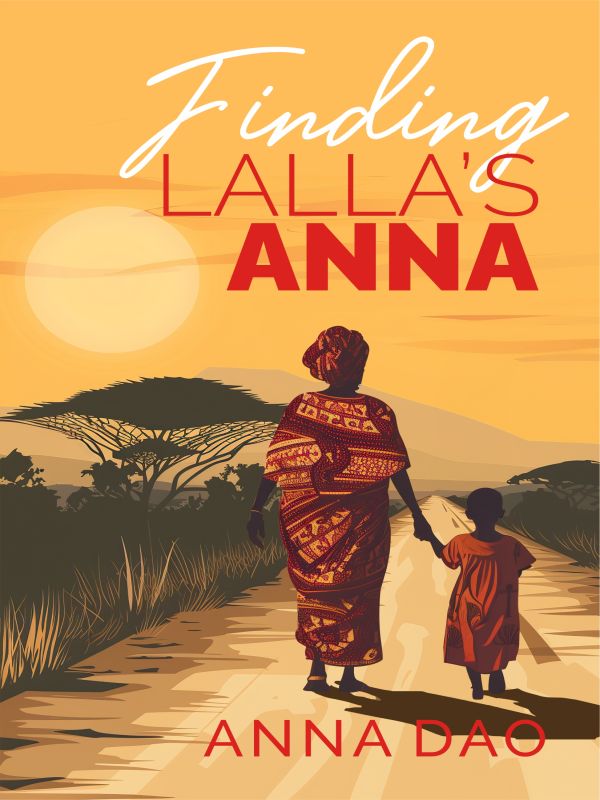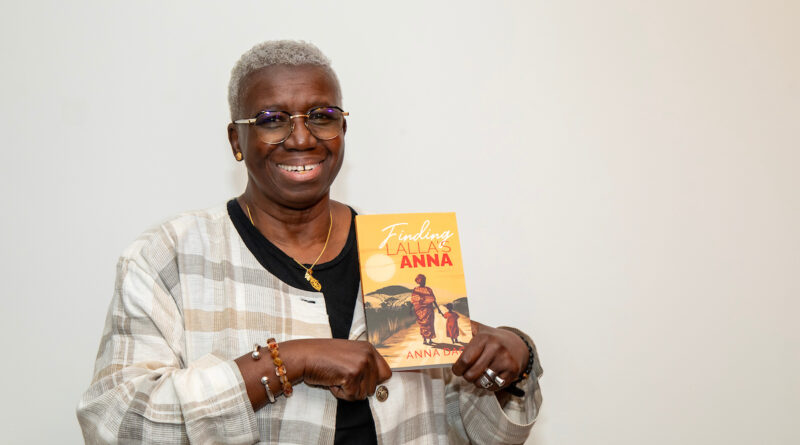Meet the Author: Anna Dao (Finding Lalla’s Anna)
Anna Dao’s lifelong dream of becoming a published author came true in April when her memoir, Finding Lalla’s Anna, was released by Wordeee Books.
Ms. Dao has worked at NYCHA for 14 years and is a Community Coordinator in Project Management Operations’ HUD Inspections Unit. The HUD Inspections Unit is the liaison for the NSPIRE HUD inspections, which aim to reduce health and safety hazards. The HUD Inspections team, including Ms. Dao, were recently recognized for their work at NYCHA’s Employee Recognition Program on November 7.
Finding Anna’s Lalla is a love letter to both Ms. Dao’s grandmother, Lalla, and to Ms. Dao herself. In it, she reflects on the strong and nurturing bond she shared with her grandmother. Growing up with an absent mother and a diplomat father who traveled often, Lalla was a constant presence in Ms. Dao’s life. With her grandmother, Ms. Dao found someone who saw her for who she truly was, even when she struggled to see herself. Lalla’s unwavering love and support, combined with Malian ancestral teachings, helped Ms. Dao navigate emotional burnout and guided her through the journey of self-discovery, self-love, and acceptance.
The book is dedicated to her grandmother. In the dedication, Ms. Dao wrote:
Lalla – Daba’s gift to me. She walked me to the gate then dared me to go in and take the mysterious, perplexing, and at times incomprehensible journey to finding, and becoming, the Anna only she saw in me.
She poured herself into me.
And I hope I turned out to be a lot like her.
NYCHA Now spoke with Ms. Dao about the process of writing her memoir, getting it published, and what she wants readers to take away after reading the book.
What inspired you to write the book?
My grandmother and my own journey. I have a good life. It has its ups and downs, but what I like about the woman who sits in front of you is that I’ve never seen myself as a victim because I was raised by people who didn’t see themselves as victims. You take what life throws at you, and you do the best you can, without judgment. It’s life, and you shouldn’t apologize for being who you are. Today the world is judgmental and not very accepting. We have tons of books and experts telling us how to be, what to be, and how to feel. I believe that at the core of it, however you want to be, be that for that moment, because life is a cycle. You have to sit down with your own self regardless of what anybody tells you.

What do you want readers to be left with after reading your book?
Be you. Whatever that means to you. When I had this conversation with Lalla where I was at my breaking point, she said, “You have to find yourself, right? You can pick and choose from what the outside world has to offer that you want to incorporate, but you need to be you.”
Every day that you wake up, it’s your best life. There’s no such thing as getting to the best life. Every day that you wake up and do what you need to do, you are living your best life. Be kind to yourself, because we live in a world where we are very quick to judge and point fingers. Don’t beat yourself up. You have survived and you’re standing. We are standing on the shoulders of somebody who had to survive for us to be here, so we need to talk about our own resilience and our trauma. We pull through and represent ourselves to the world each and every day.
What was the most challenging part of writing your memoir?
Writing the part where I was angry and hurt at my mother, because the last thing you want to admit when you feel that way is that you love somebody. But the most liberating part was that after I wrote it, it gave me the real view of what life was like for her. She left me some nuggets where I could re-live some of those moments that were really special between her and I, where I could see the shy woman who didn’t know how to reach me. And now this is a part of my story that I’ve owned.
Do you have a background or training in writing?
No. My secret weapon is the storytelling. I come from Mali, where we have the oral tradition; everything is conversation. My childhood was infused with this oral tradition, so even though I didn’t take [writing] classes, I feel comfortable and in tune with going back to a conversation to capture how it went, how people spoke, what we use to build suspense, and adding the silences that are woven in.
How long did it take you to write the book?
Twenty years off and on. When I came to the U.S., English was difficult. [Ms. Dao moved to the U.S. in 1993.] I started writing some of the chapters before I could speak English well, and writing in French wasn’t an option because you don’t come to the U.S. to write a book in French!
Do you remember what the first part of the story was that you wrote?
I wrote the middle of the book first. Initially, I was going to tell people how to be happy, but that didn’t go far because it wasn’t my story. I realized that the book had to be my truth, even if my family was going to be mad. Before my grandmother passed, she asked me how my writing project was going. I told her I was still working on it and there were a lot of sensitive details. Her questions to me were, “Is it the truth? Are you telling your truth?” She told me not to worry about the world – as long as I wasn’t telling the story in a way to hurt somebody but telling it with compassion.
How did you get your book published?
I was writing at my favorite Harlem cafe and someone came by and said, “Oh, you’re a writer.” I said I was trying to be a writer and had a big pile of rejections. They told me I should get in touch with Marva Allen at Hueman Books because they also have a publishing branch. I learned that actress Sheryl Lee Ralph published her latest book with them, too, so that gave them the credibility for me. I had the best experience with them.
Tell me about some of the readings you’ve done since the book published.
As I’m getting more comfortable with readings, what is most gratifying about it is that the story seems to resonate with people. I really love to talk about it because it resonates across generations, from high school and college-aged kids to people closer to my age; learning to see your own value is an important reminder.
To hear Ms. Dao talk more about her book, listen to her interview on the A55 Podcast, which features “remarkable conversations with Africans at home and in the diaspora.”







